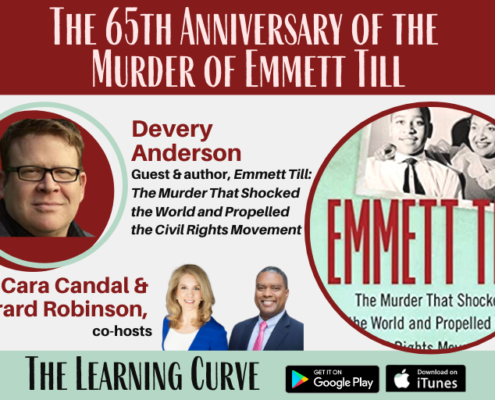Ayaan Hirsi Ali, International Best-Selling Author & Human Rights Activist
This week on “The Learning Curve,” Gerard and Cara talk with Ayaan Hirsi Ali, a Research Fellow at the Hoover Institution, founder of the AHA Foundation, and author of the books Prey: Immigration, Islam, and the Erosion of Women’s Rights, Infidel: My Life, and Nomad: From Islam to America – A Personal Journey Through the Clash of Civilizations. Ms. Hirsi Ali shares insights from her upbringing and early education in Somalia, Saudi Arabia, and Kenya, as well as her courageous immigration to the West, where she experienced an intellectual awakening that led to human rights activism and a seat in the Dutch Parliament. They discuss why all human rights and free speech advocates should be concerned about the rise and growing militancy of political correctness and “cancel culture” in the West, its impact on reasoned public debate, and what educators need to teach young people about the importance of open mindedness and the free exchange of ideas. Lastly, Ms. Hirsi Ali reviews the central theme of her latest book, Prey, which explores the long-term ramifications of mass migration from Islamic-majority countries on the rights of women in Europe, given the different value systems between these countries and the West, with its commitment to the rule of law, rights-centered constitutionalism, science, and religious liberty. She concludes with a reading from the book.
Stories of the Week: The Biden administration is ordering states to continue federally required standardized tests this year, though there is flexibility on the exam format and accountability standards. Is this an opportunity for innovation in student testing? All members of a San Francisco-area school board resigned after mocking parents at a virtual meeting that they didn’t realize was already being broadcast live. Was this an isolated incident or a window into their general outlook toward families?
Guest:
 Ayaan Hirsi Ali is a Research Fellow at the Hoover Institution, Stanford University and founder of the AHA Foundation. She served as a Member of the Dutch Parliament from 2003 to 2006. While in Parliament, she focused on furthering the integration of non-Western immigrants into Dutch society, and on defending the rights of Muslim women. She has written several books including Infidel: My Life (2007), Nomad: From Islam to America – A Personal Journey Through the Clash of Civilizations (2010), Heretic: Why Islam Needs a Reformation Now (2015), and The Challenge of Dawa (2017). Her new book, Prey: Immigration, Islam, and the Erosion of Women’s Rights, is now available. Prior to joining the Hoover Institution, she was a Fellow at the Belfer Center’s Future of Diplomacy Project at Harvard University, and a Resident Fellow at the American Enterprise Institute in Washington, D.C. She received her Master’s degree in Political Science from Leiden University in the Netherlands.
Ayaan Hirsi Ali is a Research Fellow at the Hoover Institution, Stanford University and founder of the AHA Foundation. She served as a Member of the Dutch Parliament from 2003 to 2006. While in Parliament, she focused on furthering the integration of non-Western immigrants into Dutch society, and on defending the rights of Muslim women. She has written several books including Infidel: My Life (2007), Nomad: From Islam to America – A Personal Journey Through the Clash of Civilizations (2010), Heretic: Why Islam Needs a Reformation Now (2015), and The Challenge of Dawa (2017). Her new book, Prey: Immigration, Islam, and the Erosion of Women’s Rights, is now available. Prior to joining the Hoover Institution, she was a Fellow at the Belfer Center’s Future of Diplomacy Project at Harvard University, and a Resident Fellow at the American Enterprise Institute in Washington, D.C. She received her Master’s degree in Political Science from Leiden University in the Netherlands.
Next show’s guest (Weds., March 3rd) is Tommy Schultz, CEO-elect of the American Federation for Children.
Tweet of the Week:
Stevie Wonder explains why he's moving to Ghana permanently. https://t.co/5HdvpY13SR
— Ted Gioia (@tedgioia) February 21, 2021
News Links:
Schools must still give standardized tests this year, Biden administration says
https://www.chalkbeat.org/2021/2/22/22296173/biden-administration-state-tests
Entire School Board Resigns After Members Are Caught Mocking Parents on Livestream
https://www.nytimes.com/2021/02/20/us/oakley-school-board-hot-mic.html#click=https://t.co/aXFSqxCEgC
Get Updates on Our Education Research
Recent Episodes:




















